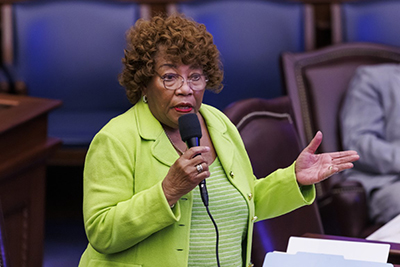
Three local entities made pitches to the group, which also discussed other potential homes for the museum.
(Source: Florida Politics)
For members of a state-created group tasked with developing plans and recommendations for a proposed Florida Museum of Black History, the aims are high.
The details, meanwhile, still need to be ironed out.
On Monday, the nine-member Florida Museum of Black History Task Force convened for its third meeting to discuss what information is still needed to determine the project’s scope.
Funding and location were also major subjects during the meeting’s runtime of three and a half hours.
To better inform future discussions, the group’s Chair, Sen. Geraldine Thompson, said she’d requested a feasibility study that will include locational, financial, archaeological and genealogical considerations, among other things.
She also recommended that the task force employ the assistance of the Compass Group, which has worked with the Civil Rights Institute in Birmingham, Alabama, and the Tubman Museum in Macon, Georgia, among others, to determine where the museum would have its best shot at self-sustenance.
Three local entities made pitches to the group. The first was Orlando International Airport, whose Senior Vice President of Public Affairs, Angela Stark, said the hub’s in-development South Terminal Complex would be ideal for the institution.
She noted the terminal will be home to a new Brightline station. The airport is on track to welcome a record 58 million travelers this year. Orlando had 74 million visitors last year, of which 17% visited a museum during their trip, Visit Orlando’s Kristen Rotherbaur-Westover said.
The panel also heard from Regina Davis, Executive Director of the Big Bend Community Redevelopment Agency, who proposed that the city of Quincy just 20 minutes west of Tallahassee should top the list for a Black history museum — and that it already has a similar but far more modest project underway.
Seminole County also threw its hat into the ring. Guilherme Cunha, administrator for the county’s Office of Economic Development and Tourism, cited the rich African American history of the county seat, Sanford, which was home to the first branch of the NAACP.
Task Force member Terri Lipsey Scott, the Executive Director of the Carter G. Woodson African American Museum in St. Petersburg, suggested the group look at her city too.
Member Gayle Phillips, the Director of the Lincolnville Museum and Cultural Center also in St. Augustine, said St. Johns County would be fitting. Not only is it home to the oldest Black history museum in the country, she said, but it’s also recognized by UNESCO as the site of the first legally sanctioned free African American settlement within present-day U.S. borders.
Representatives from Panama City were scheduled to present but missed the meeting.
Melinda Horton, the Executive Director of the Florida Association of Museums, recommended that the task force look at cultural hotspots like Miami, Tampa and other “amazing areas” in the state that could ensure the museum thrives.
Horton, who isn’t a member of the task force, pointed out that the Florida Legislature hasn’t earmarked consistent funding for the museum and might not do so.
“You really need to look at sustainability,” she said. “If you do get funding from the state, that’s awesome, but what if we have a bad year?”
The task force — whose other members include Reps. Berny Jacques, JCB Construction President Brian Butler, Touchpoint Innovative Solutions CEO Howard Holley, State University System Vice Chancellor of Public Affairs Tony Lee — also discussed the minimum criteria for the project.
None is outlined in the measure (HB 1441) lawmakers unanimously approved earlier this year to establish the task force.
As previously reported by Florida Politics, the measure’s sponsor, Rep. Bruce Antone, envisioned a single, monumental structure full of artwork, life-size replicas of people and interactive displays spanning 100,000 square feet of exhibit space, a 10,000-square-foot entrance hall and atrium and 10 different halls, each dedicated to a Black history theme.
However, nothing is set in stone, Thompson reminded members.
“We will make the decision whether we’re talking about one structure or satellite structures,” she said.
Thompson reiterated the need for the museum to be self-sustaining, a requirement in Antone’s bill. One way to help do that, she said, was for the state to sell custom license plates to support the institution’s operations.
Antone’s bill details other on-site revenue sources, including “meeting rooms, full-service banquet facilities that include a kitchen capable of serving at least 250 people at a single event, and a performing arts theater that shall be made available for private events.”
But the popularity and resultant success of all those amenities still depend on where the museum rises, said Thompson, who founded the Wells ‘Built Museum of African American History and Culture in Orlando.
“As we get down to location, I want us to think about the question a lot of us have heard, ‘If a tree falls in the forest and no one hears it, does it make a sound?’” she said. “If you locate this facility where you’re not going to get a critical mass of people to generate admission revenue, are we telling the story that we hope to tell, and is it going to be self-sustaining?”
The next meeting of the task force — which also includes Sen. Bobby Powell and Rep. Kyan Michael, who were absent Monday — is Dec. 15.
Five other monthly meetings are planned through May, by which a proposed location, design, digital rendering, floor plan, marketing plan and plan for a transition from state funding to self-sufficiency — all to be funded with a $20,000 state appropriation — must be approved.
After that, Florida Department of State staff must assemble a report, due back to lawmakers on July 1.


Be the first to comment